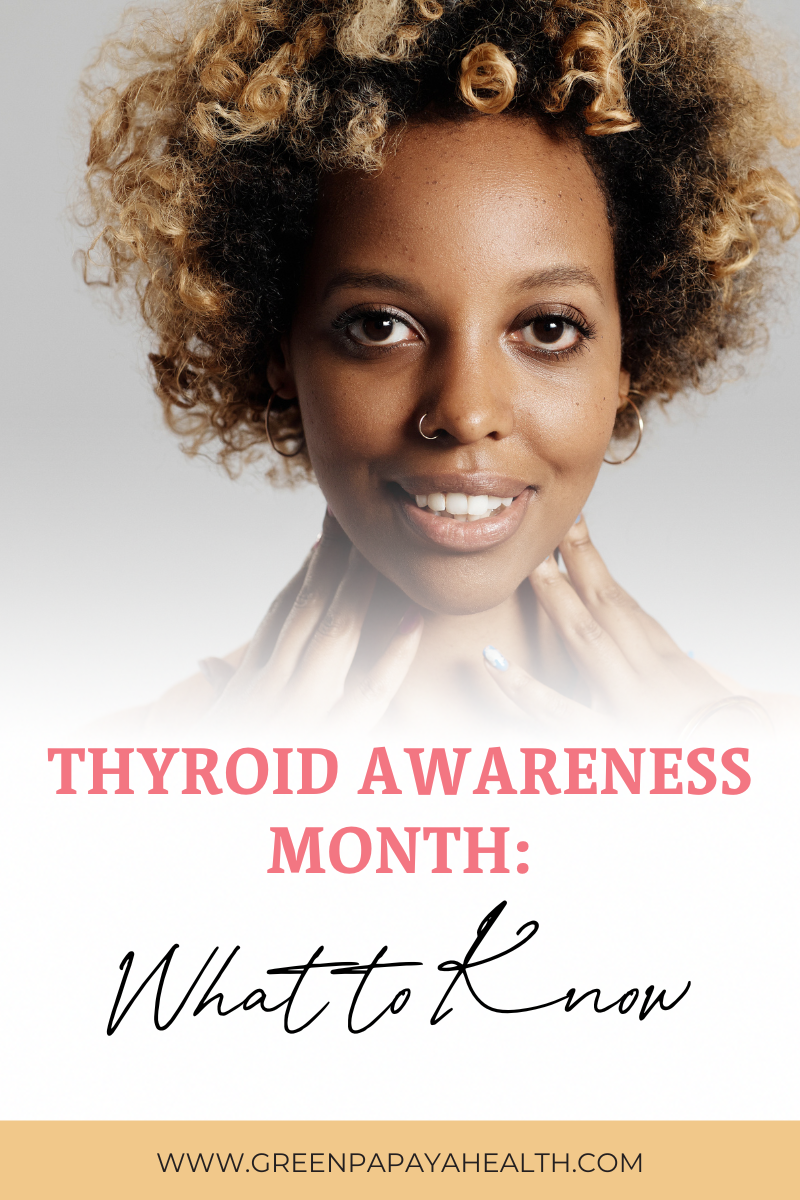The butterfly-shaped thyroid gland is only about two inches in length, but don’t be fooled by its tiny size. This small-but-oh-so-mighty endocrine gland produces hormones that regulate everything from our metabolism and body temperature to our heart rate and menstrual cycle. After all, that’s why the month of January is all about promoting thyroid awareness, and why Dr. Fox and I have dedicated our careers to helping patients around the world with complex, chronic health conditions such as hypothyroidism and Hashimoto’s thyroiditis.
We could talk about thyroid health all month long and there would still be so much more to discuss, so this blog is going to focus on just three important things: the differences between hypothyroidism and Hashimoto’s, the connection between Hashimoto’s and other autoimmune conditions, and some of the potential root causes of autoimmune thyroid disease. For more in-depth information on the thyroid gland and its function, we encourage you to read last year’s thyroid awareness blog.
1. Hypothyroidism & Hashimoto’s Are Not the Same Thing
Though hypothyroidism and Hashimoto’s are often used interchangeably, these two conditions are not the same. Hypothyroidism is a condition that occurs when the thyroid fails to produce enough of the hormones triiodothyronine (T3) and thyroxine (T4), resulting in an underactive thyroid and symptoms of thyroid hormone deficiency.
On the other side of the coin, Hashimoto’s thyroiditis is an autoimmune disease that occurs when the immune system attacks healthy thyroid tissues. This can result in the underproduction of thyroid hormones and sometimes the development of hypothyroidism.
With that being said, Hashimoto’s is the leading cause of hypothyroidism in individuals over the age of six. It’s also the most common autoimmune condition worldwide. Those with Hashimoto’s disease, however, may experience hypothyroid and hyperthyroid symptoms — as well as other symptoms like gut issues, allergies, pain, and various food tolerances. Dr. Fox and I recommend running a full thyroid panel to check your thyroid hormone levels and thyroid antibodies.
2. People With Hashimoto’s Often Have Other Autoimmune Conditions As Well
Finding out you have Hashimoto’s is overwhelming enough: you may need to change your diet, take thyroid medication, look for ways to minimize your toxin exposure, and make other lifestyle modifications to keep your long list of symptoms under control. But for me and many other women with Hashimoto’s, the lingering symptoms we experience are connected to Hashimoto’s thyroiditis as well as other autoimmune conditions that affect the skin, joints, connective tissues, and major organs.
Who’s at risk of developing multiple autoimmune conditions?
To determine the prevalence of autoimmune comorbidities in Hashimoto’s disease, a cross-sectional study was conducted to evaluate 1,053 child, adolescent, and adult patients with Hashimoto’s. The study was published in the European Journal of Endocrinology.
According to the results, 23.8 percent of Hashimoto’s patients had other associated autoimmune diseases in addition to autoimmune thyroiditis. Researchers also found that the risk of developing multiple autoimmune conditions increased with age, and comorbidities were much more common in adults — particularly females.
The autoimmune diseases that most commonly co-occur with Hashimoto’s include:
- Rheumatoid arthritis.
- Type 1 diabetes.
- Celiac disease.
- Pernicious anemia.
- Lupus.
- Crohn’s.
- Addison’s disease.
- Vitiligo.
Of course, your risk of developing one or more autoimmune conditions depends on factors such as your genetics, intestinal health, and exposure to potential triggers like dental issues, mold and other environmental threats, nutrient deficiencies, and stress. Many factors come into play.
3. Finding Your Root Cause is the First Step Toward Thyroid Healing
As with other autoimmune conditions, those of us with Hashimoto’s thyroiditis often develop the disease when we’re exposed to one or more triggers that cause the immune system to attack the thyroid gland. Identifying these triggers can help us to determine the root causes of our autoimmune condition(s) and take steps to get our lives back. Some examples of these root causes include chronic stress, dental and medical procedures, nutrient deficiencies, exposure to mold and other toxins, Lyme, increased intestinal permeability (or leaky gut), food sensitivities, and infections.
Finding each of your root causes is your first step toward healing your thyroid and eliminating symptoms such as fatigue, brain fog, digestive issues, depression, and joint pain. Whether you’re dealing with Hashimoto’s, hypothyroidism, or another complex, chronic medical condition, Dr. Fox and I will help you to uncover your root causes, make lifestyle modifications that allow your body to heal, and get your health back!
Ready to transform your health this Thyroid Awareness Month? Book your free Discovery Call and learn about how 1:1 Functional Medicine Coaching can help you to heal from Hashimoto’s, thyroid disease, and other complex medical conditions.
Sources
- https://www.endocrineweb.com/conditions/thyroid-nodules/thyroid-gland-controls-bodys-metabolism-how-it-works-symptoms-hyperthyroi
- Wentz, I. (2017). Hashimoto’s protocol. HarperOne.
- https://www.ncbi.nlm.nih.gov/books/NBK459262/
- https://eje.bioscientifica.com/view/journals/eje/176/2/133.xml







Pingback: How to Detox the Body From Toxic Mold - Vashti Kanahele